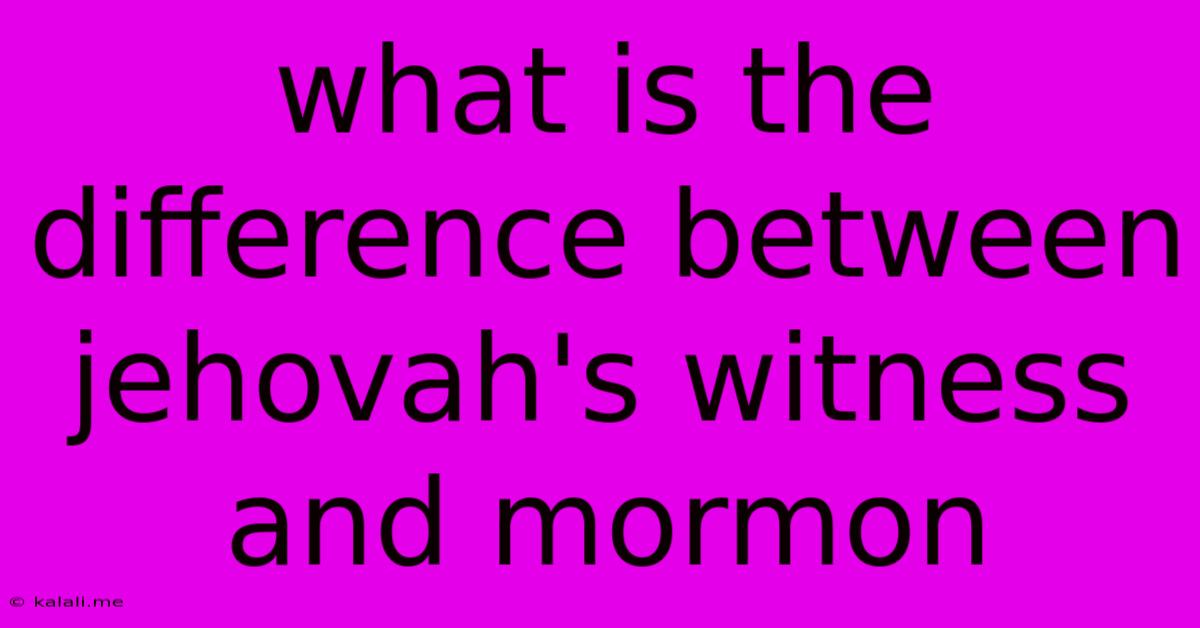What Is The Difference Between Jehovah's Witness And Mormon
Kalali
May 28, 2025 · 4 min read

Table of Contents
Jehovah's Witnesses vs. Mormons: Key Differences in Beliefs and Practices
Meta Description: Explore the core differences between Jehovah's Witnesses and Mormons, examining their distinct beliefs about the Bible, Jesus Christ, salvation, and church governance. Understand their unique practices and how they diverge from mainstream Christianity.
Jehovah's Witnesses and Mormons are often mistakenly grouped together as "Christian cults" due to their distinct beliefs and practices that deviate from mainstream Christianity. However, significant theological and practical differences exist between these two groups. Understanding these distinctions requires examining their core beliefs, scriptures, and approaches to religious life.
Core Beliefs: A Tale of Two Interpretations
Both Jehovah's Witnesses and Mormons claim to be Christian, but their interpretations of the Bible and the nature of Jesus Christ differ significantly.
Jehovah's Witnesses:
- The Nature of God: Center their belief system on Jehovah, whom they view as the only true God. Jesus Christ is considered the first creation of God, a powerful angel, but not divine in the same sense as Jehovah. They reject the Trinity doctrine.
- The Bible: Accept only the Bible as their sacred scripture, emphasizing a literal interpretation, albeit with their unique doctrinal framework.
- Salvation: Believe salvation is earned through faith and obedience to Jehovah's commands, including strict adherence to their teachings and participation in their preaching work.
- Jesus Christ: View Jesus as the Messiah, the Son of God, but not God himself. They believe in his sacrifice for mankind, but their understanding of atonement differs from traditional Christian views.
Mormons (The Church of Jesus Christ of Latter-day Saints):
- The Nature of God: Believe in a God who is a glorified man, who is the Father of Jesus Christ, and they accept the Trinity doctrine in a unique way. They believe that God the Father, Jesus Christ, and the Holy Ghost are three distinct persons but one God.
- The Bible: Accept the Bible as scripture, but consider it incomplete. They also incorporate other sacred texts like the Book of Mormon, Doctrine and Covenants, and Pearl of Great Price.
- Salvation: Believe in salvation through faith in Jesus Christ, repentance, baptism, and adherence to their religious practices, including temple ordinances. This pathway, however, involves a unique understanding of exaltation, the ultimate goal of progression.
- Jesus Christ: Believe in Jesus Christ as the central figure of their faith, the Son of God, and the Savior of mankind; viewing Him as fully divine, in contrast to Jehovah's Witnesses.
Practices and Lifestyle: Divergent Paths
The differences in belief systems translate into distinct practices and lifestyle choices:
Jehovah's Witnesses:
- Preaching: Dedicate significant time to door-to-door preaching and distributing religious literature, considering it a core aspect of their faith.
- Blood Transfusions: Strictly prohibit blood transfusions, even in life-threatening situations.
- Political Neutrality: Maintain strict political neutrality, refusing to participate in political activities or pledge allegiance to any nation.
- Celebrations: Refrain from celebrating holidays and birthdays, which are considered pagan traditions.
Mormons:
- Temple Worship: Emphasis on temple worship and rituals, considered sacred and essential for spiritual growth and progression.
- Family Structure: Strong emphasis on family and the importance of family unity, with a focus on marriage and raising children within the church's teachings.
- Word of Wisdom: Adherence to a health code called the Word of Wisdom, which encourages a healthy lifestyle and restricts the consumption of alcohol, tobacco, and caffeine.
- Missionary Work: Actively engage in missionary work, sending young adults on missions to spread their faith.
Governance and Organization: Separate Structures
The organizational structures of both groups are also distinct:
Jehovah's Witnesses:
- Governing Body: Governed by a small, self-appointed group known as the Governing Body. This body interprets scripture and determines church doctrine and practices.
- Hierarchical Structure: Follow a hierarchical structure with appointed elders and ministers.
Mormons:
- Hierarchical Structure: Also feature a hierarchical structure, led by a President and the Quorum of the Twelve Apostles. However, the structure is more formalized and decentralized.
- Local Congregations: Have local congregations led by local leaders and a strong emphasis on community involvement.
In conclusion, while both Jehovah's Witnesses and Mormons are distinct religious groups that differ substantially from mainstream Christianity, their theological beliefs, spiritual practices, and organizational structures demonstrate significant divergences between them. Understanding these differences requires a detailed examination of their core doctrines and lived experiences.
Latest Posts
Latest Posts
-
Convert Non Clickable Url To Clickable Url Google Sheets
May 30, 2025
-
Wordpress Programmatically Control Screen Element Setting
May 30, 2025
-
Do Background Checks Include Drug Tests
May 30, 2025
-
How To Measure The Length Of A Sesier Curve Blender
May 30, 2025
-
What Is Ol On A Multimeter
May 30, 2025
Related Post
Thank you for visiting our website which covers about What Is The Difference Between Jehovah's Witness And Mormon . We hope the information provided has been useful to you. Feel free to contact us if you have any questions or need further assistance. See you next time and don't miss to bookmark.